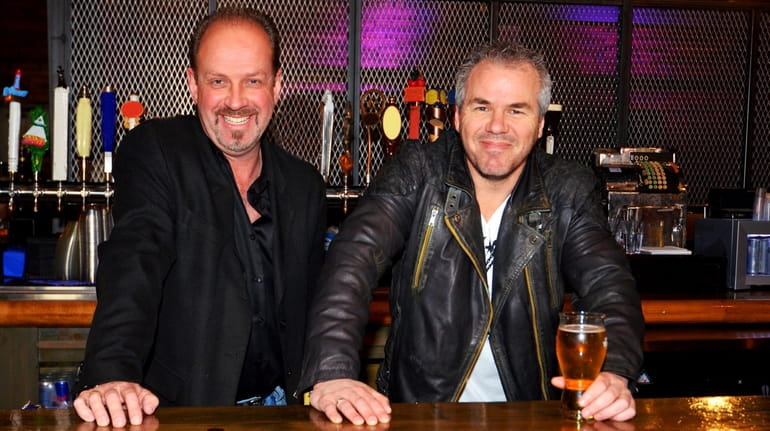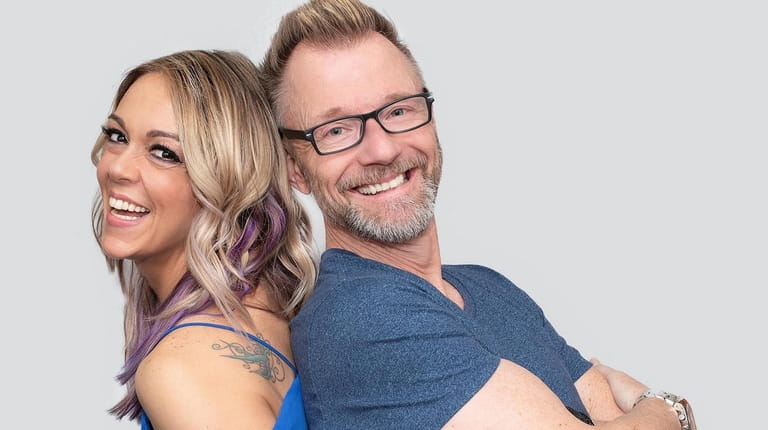LI radio hosts bonding with listeners during pandemic

The WBAB morning team: Roger Luce (l) and JP Parise. Credit: David Ungar
Newsday is opening this story to all readers as we provide Long Islanders with news and information you can use during the coronavirus outbreak. All readers can learn the latest news at newsday.com/LiveUpdates
"You're playing for pride, not prizes," announced the familiar voice on the familiar radio program, on a recent morning just after 8:30. The long-running WBAB staple "Roger and JP" was getting ready to wrap, while just outside the West Babylon studio spread a suburban moonscape — unpeopled and largely un-carred, too. The proverbial tumbleweed blew down center lane on Sunrise Highway which normally would be a slow-rolling parking lot.
The world may have stopped but the show must go on, and especially the contest.
Always the contest. This one was "in honor of the death of Kenny Rogers — the top ten biggest Kennies" who had also recently departed. There would be no advertisers to give out prizes for right answers so to the victor would go "pride."
Co-hosts Roger Luce and John Parise — who have been doing this sort of stuff for 20 years — didn't have long to wait for the calls and texts to come in. Some wiseguy comes up with "Ken" of Ken and Barbie. Luce gets a tweet "from my buddy Ken. He says 'Heiny Ken.'"
By closing time at 9 a.m., neither prize nor obviously pride had been bestowed, but something else had been established: People were listening.
Exactly how many is anyone's guess. Ratings don't come in until mid-April, but about half a million listeners tune in to the big Long Island stations like WBAB, WBLI or WALK over the course of an average week. These last couple of weeks haven't exactly been average, however.
Nevertheless, people are listening out there in the eerie void — almost certainly lots of people, and almost certainly in front of their laptops, or smartphones, or through Alexa, while it ("she"?) also juggles questions about viruses and pizza takeout. Meanwhile, the die-hards have radios in their kitchens. (Yes, there are still "radios.")
In fact, hosts and executives at the big three Long Island radio groups (JVC, Connoisseur and Cox) say more, and perhaps many more, people are tuning in than usual. Media consumption is up everywhere because audiences are captive and the appetite for information is insatiable.
Yet for local radio this situation is unprecedented and, at least in theory, potentially catastrophic. The streets are empty, most stores and offices closed. Cars and offices are radio's natural element and key venues, while morning drive-time is radio's prime-time but "there's no doubt that after 7 a.m. we're feeling increased interaction from a larger quantity of listeners," says Luce. "They're Long Islanders with more time to listen, less hectic schedules, and they're spending more hours listening because this is a serious situation."
Ana-Maria Caraballo, co-host of a Spanish-language morning show on WBON/98.5/La Fiesta, says "We usually get a surge of listener [calls] at 8 a.m. and now the same thing is happening from 6 a.m. all the way through to 9 p.m. at night."
Jim Condron, who runs Connoisseur's five LI-based stations (WALK, WBZO, WKJY, WWSK and WHLI) declines to offer specifics about listenership, but confirms that "there will be a dramatic change in where people listen and how people listen."
Like the rest of the media world, radio has pivoted to meet the times. Listenership may be up, but business is lousy so in lieu of ads, stations are airing PSAs and freebies from valued advertisers, reminding everyone that this horror show will be over some day and their doors back open. Without ads, there's more music on their air and lots more talk too.
They're also reaching out to listeners in new and novel ways. Connoisseur, for example, has forged an alliance with LI Cares to help "80,000 food-insecure school-age kids," says Condron. Along with her radio show, Caraballo has launched a Facebook Live series for her listeners, many of whom are particularly hard pressed, telling them "how to get financial help, where to go for supplies, where to go to report price gouging," she says.
But all of this goes only so far in explaining local radio's current resurgence. Here's another way to explain it: We're all caught up in this historically weird and unsettling moment. The unknowns remain stubbornly unknown, refusing to dispel, or to submit to what TV news tells us for the umpteenth time. You hear that a friend is sick. You wonder, then worry. You hear that a favorite restaurant has closed. You wonder if it will ever reopen. We're way past the shock about toilet paper shortages, and instead now obsess about what else is missing from the empty store shelf in the empty store we're afraid to go into.
And so, alone in the darkness, we reach for the familiar — or maybe the alarm clock goes off in the darkness and we don't have to reach for it at all. Ah, there's a voice you know and have known for decades — the "Wiseman" ("Oldies 98.1"), or Jim Douglas (WBZO/MAX 103), or Steve Harper (105.3/Party 105) or Roger and JP. They are talking to us and just as easily, we can talk to them.

Steve Harper (r) and Leeana Costa host a morning show on WPTY/Party 105.3. Credit: Jeannie Powers
"We're now in the age of social distancing and people are really looking to connect and learning how to do that in different ways," says Leanna Costa who recently reunited with her longtime co-host Steve Harper on Party 105. "The fact that Old Faithful is still there for them does bring some sense of comfort."
Old Faithful does have a unique advantage and on Long Island, a unique audience too. John Caracciolo, chief executive of JVC Media which owns four Long Island stations along with a handful in Florida, says "we're tough on Long Island, and we stick together, and we get mad together and — I think — we stand together. In Florida, everyone's spread out and it's every man for himself."
He can always tell the difference from the callers — that singular regional pride bound to that singular regional accent — but admits something else has now crept into the conversation. That would be fear bound to isolation.
Andrew Sykora, the "Syke" of WBLI's long-running morning team "Syke and MJ," puts it this way: "We're always supposed to smile-and-get-through-this, and as Long Islanders, we always get through whatever we're faced with. When there's a crisis we come together but with this pandemic we're told to stay apart." Radio at least offer some chance to re-group, he says.
Carol Silva, recently retired News12 morning anchor who spent the first part of her career at various Long Island radio stations, says that radio can "hyperlocalize" in ways TV couldn't even dream of but adds that "people literally want to be heard and radio offers that opportunity. It's much easier to have a two-way conversation with listeners who are used to calling their radio station. It's what they do."
"Are [Long Islanders] more drawn to [the call-line] than other places? I don't know but I can tell you that I don't think anybody does it better than the stations here."
On that recent morning with those call-lines finally silent, Roger and JP reflect on their own Kafkaesque lives and this newly Kafkaesque world. These are not Kafkaesque guys by any stretch — more like Def Leppard ones — yet even they can't escape the enveloping madness.
They haven't attempted to either. Both still arrive at the studio each morning at 5 a.m. Most other LI radio hosts have been broadcasting from home, but they insist the only way to work the call lines is from a studio that's equipped to juggle them all. In a phone interview, Parise said that their bosses "gave us the option to work from home but we wouldn't have the same access to callers so decided if we're going to do this the way we [always] do it, those phone lines have to be open and we have to be the sounding board. People have fears and concerns and we have to be the place where you can get answers and talk about what they're afraid of."
Every Long Island radio station has done exactly the same thing. They've all boosted their news and self-help content. County executives Steve Bellone and Laura Curran are on many stations and are regular daily guests on this one. Luce and Parise also speak frequently to an infectious disease doctor who vets listener concerns.
But "the really important thing," says Luce, "is being able to listen to people. We learned from 9/11 and superstorm Sandy that we literally get through this together. The back-and-forth communication also helps people because you're hearing someone else talk about their own solution."
Parise and Luce say they learned firsthand about that therapeutic back-and-forth during 9/11 when they launched on-air drives to get gear to Ground Zero workers. With callers, there was anger fused to a "just an overwhelming sadness," says Luce.
"During 9/11, everyone knew somebody who works in the city who got killed and we all knew the cops and firefighters and with Sandy, we all felt it," says Parise. "I didn't lose my home but someone else did and we could all see the destruction, down the corner, right there."
They concede this moment is profoundly different. They can't organize a drive for breathing masks because the federal government can't even manage that feat. They can't apply a ready-packaged salve to someone's deepest fear because no one can.
Meanwhile, they've got their own problems to deal with as well. Parise says he's "mentally spent when I walk through the door at home and I have to push myself to be present so that I'm not stuck in this recurring dream and I try not to jam my phone down the drain. I don't want any updates over the weekend."
With another show over, they later head out the door into the empty streets. Their smartphones are still on, by the way. They're never off.
